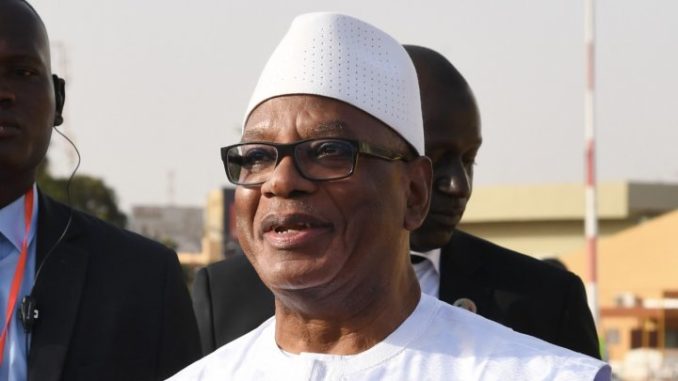
Vowing once again to crack down on spiralling insecurity, Malian President Ibrahim Boubacar Keita on Thursday visited the site of a massacre in which gunmen killed dozens earlier this week.
Attackers believed to belong to the Fulani ethnic group raided the ethnic Dogon village of Sobane Da in central
Mali on Sunday and Monday, killing 35 people, according to the government, although a local authority maintains the real figure is 95 deaths. Neither has produced evidence for these tolls.
The attack targeted the predominantly Catholic village of Sobane Da, in an ethnic Dogon enclave in the diverse Mopti region.
Keita cut short a trip to Switzerland on Wednesday to return to Mali and handle the fallout from the attack, the latest in a series of retaliatory strikes by Dogon hunters and Fulani herders that have killed hundreds of civilians this year.
The Malian leader arrived aboard a UN peacekeepers’ helicopter, flanked by the archbishop of Bamako, Cardinal Jean Zerbo, and ranking government members, including the defence minister.
A senior officer present at the visit said Keita and Zerba immediately headed to mass graves where the dead were buried. There, the archbishop “prayed for the murdered Catholic brothers”.
Keita promised that, “the state will proceed immediately to disarm anyone who illegally owns a firearm and those who refuse to surrender their arms will be sanctioned severely by the law.”
His government made a similar pledge after an attack in March by suspected Dogon militiamen that killed more than 150 Fulani villagers. But it has struggled to disarm militias, whom local communities look to for protection from Islamist militants and ethnic reprisals.
Calls for restraint
The violence between Dogon and Fulani and regular attacks by jihadist groups with links to al Qaeda and the Islamic State (IS) group have led many Malians to lose faith in their government’s ability to protect them.
Speaking to residents during his visit to Sobane Da, Keita appealed for an end to tit-for-tat ethnic violence. “I ask you not to turn to acts of revenge,” he said.
Keita’s government also announced it had fired General Sidy Alassane Touré as governor of the Mopti region where the killings occurred. It declared three days of national mourning.
Touré became the latest government official to lose his job as a result of authorities’ failure to contain spiraling ethnic violence around Mopti.
After the March attack in the village of Ogossagou, Mali’s worst act of violence in years, Keita dismissed two top army officials. His prime minister and entire government also resigned shortly thereafter.
The new prime minister, Boubou Cisse, visited the scene of this week’s killing on Tuesday, and said that among the dead were 24 children, some of whom had been shot in the back.
French forces intervened in Mali, a former French colony, in 2013 to push back a jihadist advance from the north, but the militants have since regrouped and turned parts of north and central Mali into a launchpad for attacks across the region.
©Reuters